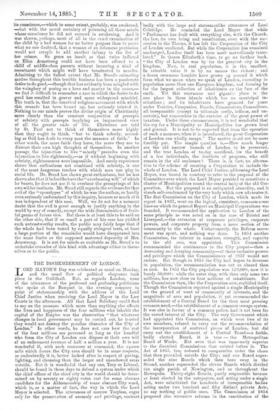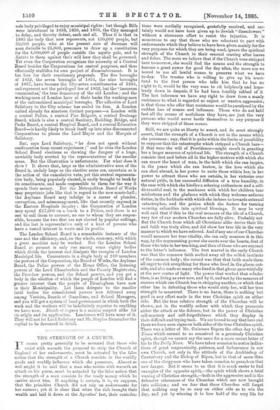THE DISMEMBERMENT OF LONDON.
T4ORD MAYOR'S Day was celebrated as usual on Monday, and the usual flow of political eloquence took place in the Guildhall. But, as regards London, none of the utterances of the professed and professing politicians who spoke at the Banquet in the evening compare in point of statesmanship with the address of the Lord Chief Justice when receiving the Lord Mayor in the Law Courts in the afternoon. All that Lord Salisbury could find to say on the measure which more than anything else affects the lives and happiness of the four millions who inhabit the capital of the Empire was the observation "that whatever changes in local government may be carried out, he trusted they would not destroy the peculiar character of the City of
• London." In other words, he does not care how the rest of the four millions are governed as long as the handful who form the City of London can dispose at their own will of an endowment revenue of half a million a year. It is not wonderful if, with such resources at command, the square mile which forms the City area should be in some respects, as undoubtedly it is, better looked after in respect of paving, lighting, and cleansing than the larger and unendowed areas outside. But it is wondei ful that any one, Tory or Liberal, should be found in these days to defend a system under which the chief officer of the chief city in the world should be deter- mined on by seventy or eighty votes cast for some obscure candidate for the Aldermanslaip of some obscure City ward, which is, as a matter of fact, the way in which the Lord Mayor is selected. The utterances of narrow Toryism, eager only for the preservation of anomaly and privilege, contrast badly with the large and statesmanlike utterances of Lord Coleridge. He reminded the Lord Mayor that while "Parliament has dealt with everything else, with the Church, the law, its own being and constitution, even with the suc- cession to the Throne, it has left the Corporation of the City of London unaltered. But while the Corporation has remained unchanged, London itself has been most marvellously trans- lated." In Queen Elizabeth's time, to go no further back, "the City of London was by far the greatest city in the kingdom. Now, in real population, it is the smallest. In rateable value it is by no means the richest ; and a dozen enormous hamlets have grown up around it which form what we mean when we speak of London, exceeding in population more than one European kingdom, and forming by far the largest collection of inhabitants on the face of the earth. Yet this enormous and gigantic place is the one place in these islands which has no municipal in- stitutions ; and its inhabitants have groaned for years under Vestries, Companies, Boards, Commissions, Committees. all irresponsible (except to tribunals costly, tedious, and un- certain), but remorseless in the exercise of the great power of taxation. Under these circumstances, it is not wonderful that the cry for a Municipality or Municipalities has grown loud and general. It is not to be expected that from the operation of such a measure, when it is introduced, the great Corporation of London can wholly escape." The matter cculd not be more forcibly put. The simple question is,—How much longer are the old narrow bounds of London to be preserved, and the true London of to-day sacrificed, for the benefit of a few individuals, the derelicts of progress, who still remain in the old enclosure ? There is, in fact, no alterna- tive to the scheme of creating a Corporation to include the whole of London. The Lord Chief Justice, addressing the Lord Mayor, was bound in courtesy to refer to the proposal of the Committee over which the Lord Mayor presided to constitute a cluster of Municipalities round the central body of the old Cor- poration. But the proposal is an antiquated absurdity, and it stands self-condemned by the very body which now advocates it. The first Commission on the City of London, which made its report in 1837, went on the logical, consistent, common-sense lines on which its general Report on Municipal Corporations was founded. It recommended the application to London of the same principle as was acted on in the case of Bristol and Liverpool,—the extension of corporate privileges, corporate powers, and corporate property from a mere section of the community to the whole. Unfortunately, the Reform move- ment was spent, and nothing was done. In 1854 another Commission, far inferior in numbers, strength, and capacity to the old one, was appointed. This Commission recommended the continuance to the City proper—then a decreasing and decaying community—of those exclusive powers and privileges which the Commissioners of 1837 would not endure. But though in 1854 the City had begun to decrease in population, the recommendation was not so absurd then as now. In 1851 the City population was 129,000, now it is barely 50,000; while the outer ring, with then only some two millions, has now close on four millions of inhabitants. But the Commission then, like the Corporation now, stultified itself. Though the Commission reported against a single Municipality on the ground of want of community of interests, and the magnitude of area and population, it yet recommended the establishment of a Central Board for the then most pressing common need,—the establishment of a common sewage system. It was also in favour of a common police, had it not been for the vested interest of the City. The very Government which had appointed this Commission, on which were two of its own members, refused to carry out the 'recommendation of the incorporation of scattered pieces of London, but did carry out the establishment of a Central Board—a feeble, badly elected Board, it is true — the Metropolitan Board of Works. But even that was immensely superior to the disunited Commissions that existed before it. The Act of 1855, too, reduced to comparative order the chaos that then prevailed outside the City; and one Board super- seded the nine Boards which then bore sway in the Strand, another superseded the eleven Boards which divided the single parish of Newington, and so throughout the Metropolis. Thirty-eight Boards, partly responsible because at least elected by the ratepayers, and acting under a single Act, were substituted for hundreds of irresponsible bodies acting under two hundred and fifty distinct private Acts, to say nothing of public ones. The Commission of 1854 proposed also extensive reforms in the constitution of the sole body privileged to enjoy municipal rights ; but though Bills were introduced in 1858, 1859, and 1860, the City managed . to delay, and thereby defeat, each and all. Thus it is that in 1885 the body that now represents, not 130,000 people, but 50,000 people, who at the present rate of decrease will soon dwindle to 25,000, presumes to draw up a constitution for the 4,000,000 of people outside the mystic pale, and to dictate to them against their will how they shall be governed. Yet even the Corporation recognizes the necessity of a Central Board besides the Corporations for central purposes, and thus effectually stultifies its own project of dismemberment. It is too late for their reactionary proposals. The five boroughs of 1832, the seven boroughs of 1854, the nine boroughs of 1867, have become the fifty-seven constituencies of 1885, and represent not the privileged few of 1832, but the immense communitas,' the true democracy of the old London ; and the working-men of London have at their backs the working-men of the enfranchised municipal boroughs. The adhesion of Lord Salisbury to the City scheme has sealed its fate. A London united already for nineteen distinct purposes—a London with a central Police, a central Fire Brigade, a central Drainage Board, which is also a central Sanitary, Building, Bridge, and Parks Board, a central Hospital Board, and a central Education Board—is hardly likely to break itself up into nine disconnected Corporations to please the Lord Mayor and the Marquis of Salisbury.
But, says Lord Salisbury, "he does not speak without confirmation from recent experience ;" and he cites the London School Board elections as showing the dangers of a huge, unwieldy body averted by the representatives of the smaller areas. But the illustration is unfortunate. For what does it show I It shows that, large as the administrative area of the Board is, unduly large as the elective areas are, uncertain as is the action of the cumulative vote, yet this central representa- tive body, being popularly elected, is easily brought to book by its constituents, and made responsible to them for the way it spends their money. But the Metropolitan Board of Works may perpetrate jobs like that in regard to the new music-hall ; the Asylums Board may indulge in a career of plunder, corruption, and mismanagement, like that recently exposed in the Eastern Hospitals inquiry ; the Corporation of London may spend £27,000 on a lunch to a Prince, and there is no one to call them to account, no one to whom they are respon- sible, because the two first are not elected by popular suffrage, and the last is representative only of a knot of persons who have a vested interest in waste and its profits.
The London School Board is a remarkable instance of the ease and the efficiency, and, on the whole, economy, with which a great machine may be worked. But the London School Board at present is only one among some eighty bodies which divide the interest and dissipate the energies of London Municipal life. Concentrate in a single body of 240 members the powers of the Corporation, the Board of Works, the Asylums Board, the Police powers of the Home Office, the licensing powers of the Lord Chamberlain and the County Magistrates, the Poor-law powers, and the School powers, and you get a body in the election of which the people of London will find a greater interest than the people of tirmingham have now in their Municipality. Let them delegate to the smaller local bodies the consolidated powers now frittered away among Vestries, Boards of Guardians, and School Managers, and you will get a system of local government in which both the work and the workers will be indefinitely superior to anything we have now. Divide et impera is a maxim suspect alike for its origin and its application. Londoners will have none of it. They will not let Lord Salisbury and Mr. Staples dismember the capital to be devoured in detail.







































 Previous page
Previous page